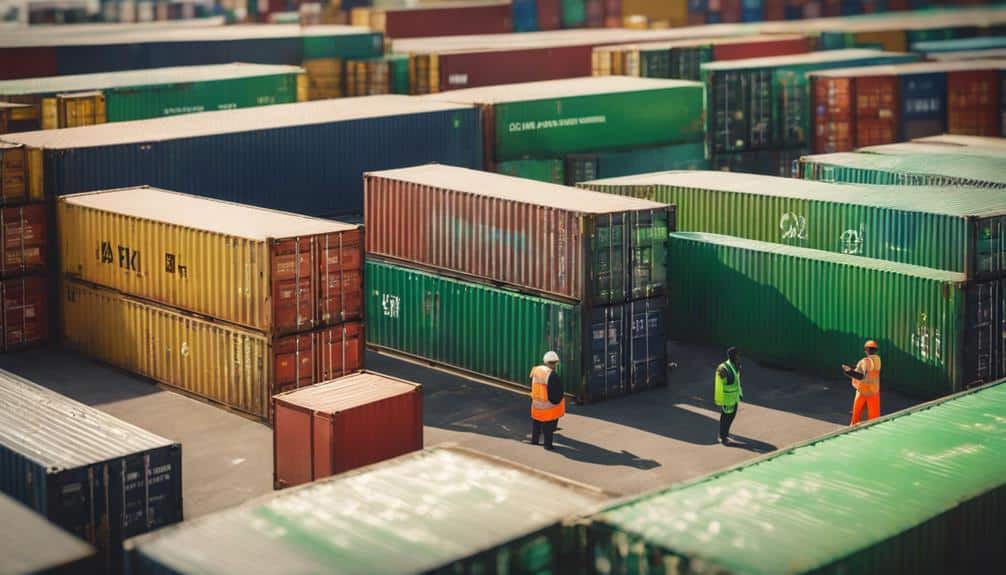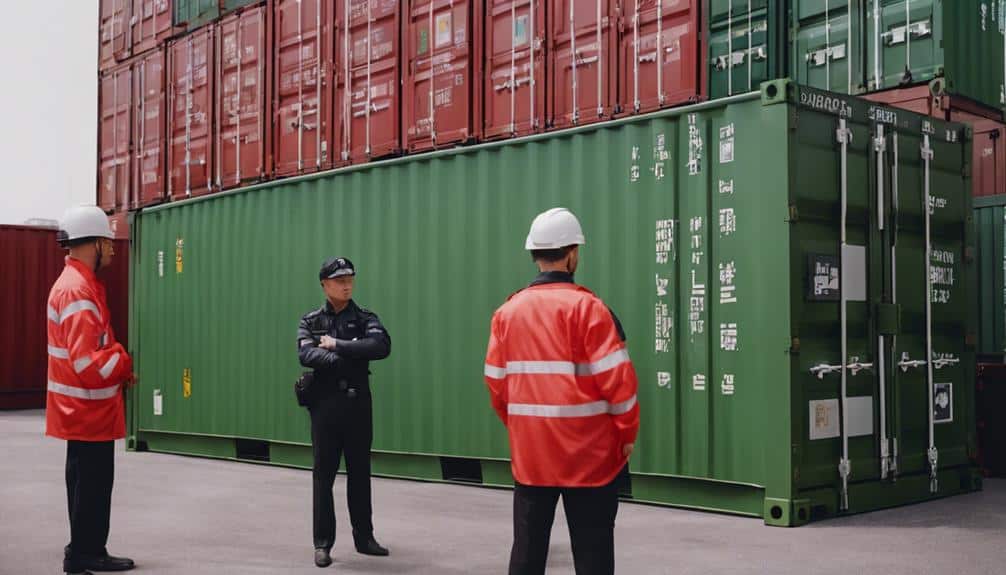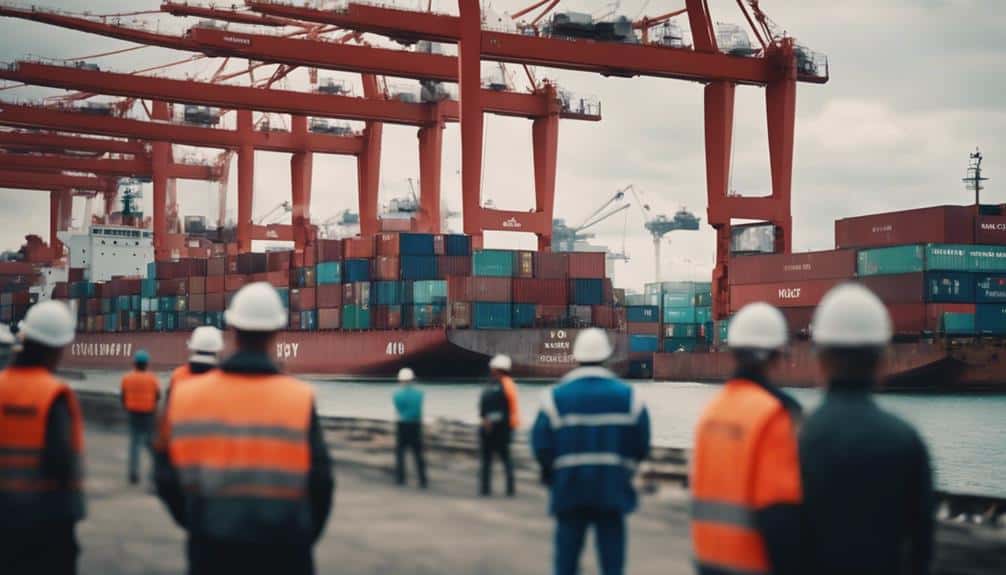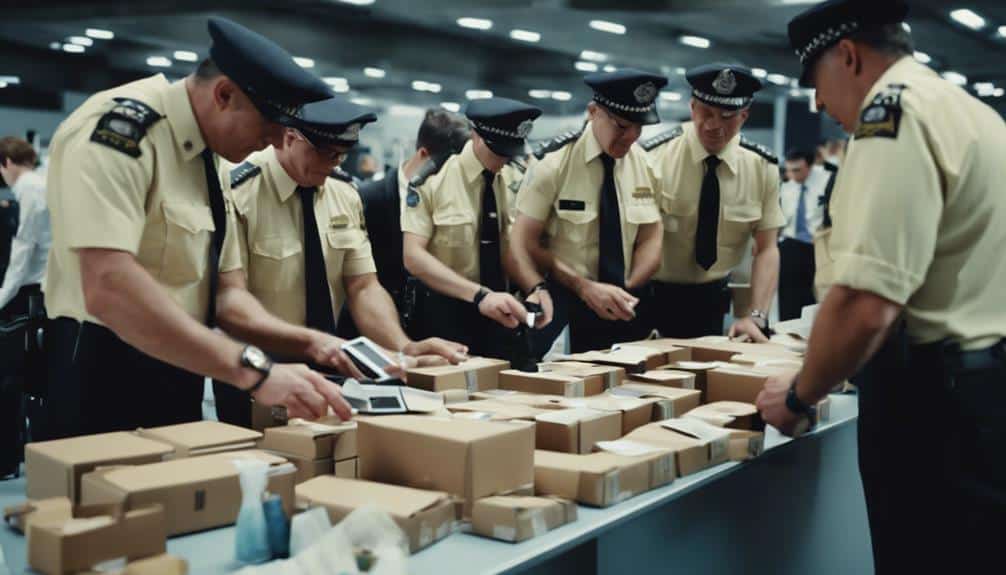Clearance in customs refers to the pivotal process ensuring the seamless movement of goods across borders. It involves strict compliance with regulations, timely payment of import duties, and meticulous submission of essential documents such as commercial invoices and certificates of origin to prevent potential delays, fines, or goods seizure. Understanding the nuances of customs clearance is vital for a streamlined flow of international trade. Delving deeper into this topic reveals the intricacies of factors affecting clearance time, ways to resolve flagged shipments, the importance of tracking updates, impact of delays on shipments, services provided by customs brokers, and the significance of proper documentation compliance.
Key Takeaways
- Customs clearance involves meeting regulatory requirements for importing or exporting goods.
- It includes submitting necessary documentation and paying applicable duties.
- Compliance ensures smooth flow of goods across international borders.
- Proper preparation minimizes delays, fines, and potential seizure of goods.
Importance of Customs Clearance

Customs clearance is an inherently vital process that must be meticulously navigated for the seamless entry or exit of goods across international borders.
Adhering to specific customs regulations and paying import duties are essential components of this process. Customs regulations dictate the necessary documentation, such as commercial invoices and certificates of origin, that must be submitted for clearance.
Import duties must be accurately calculated and paid to guarantee compliance with the law. Failure to comply with customs regulations or pay the required import duties can result in delays, fines, or even seizure of the goods.
Proper understanding and adherence to customs clearance procedures are paramount for a smooth and efficient flow of goods through international borders.
Factors Affecting Clearance Time
Several variables influence the duration required for the clearance of goods through international customs agencies.
Clearance time can be affected by factors such as the shipment value and the specific import regulations of the destination country. Higher value shipments may undergo more thorough inspections, potentially prolonging the clearance process.
Additionally, countries with stringent import regulations may require extensive documentation or compliance checks, leading to delays in customs clearance.
It is essential for importers to be aware of these factors and guarantee that all necessary paperwork is in order to facilitate a smoother clearance process.
Resolving Flagged Shipments

Factors such as missing documentation or inaccurate invoices can lead to shipment delays and require specific actions to resolve flagged shipments.
When a shipment is flagged by customs, it indicates that there are issues that need attention to guarantee customs compliance.
Shipments may be flagged for various reasons, including missing documentation, incomplete invoices, or inaccuracies in HS codes.
To resolve flagged shipments promptly, importers must work with customs brokers to provide any necessary additional documentation, correct errors, and guarantee compliance with all regulations.
Failure to address flagged shipments can result in significant delays, fines, or even seizure of the goods.
As a result, prompt and thorough resolution of flagged shipments is essential for smooth customs clearance processes.
Understanding Tracking Updates
Tracking updates provide essential information regarding the location and status of a shipment during transit.
Through advanced tracking technology, carriers offer real-time insights into the journey of packages, enabling customers to monitor their deliveries closely.
Shipment notifications play a vital role in keeping recipients informed about the progress of their orders, from pick-up to final delivery.
By utilizing tracking services, individuals can anticipate when their packages will arrive, allowing for better planning and coordination.
Understanding the various tracking updates, such as 'Out for Delivery' or 'Delivery Attempted,' helps recipients stay informed and manage their expectations accordingly.
Impact of Delays on Shipments

Timely delivery plays an essential role in ensuring the efficiency and reliability of the shipping process, making any delays in shipments a significant concern for both senders and recipients alike.
Delays can have a cascading effect on the entire supply chain, impacting not only the parties directly involved but also customer satisfaction and overall business operations.
Here are key points to evaluate regarding the impact of delays on shipments:
- Shipping Efficiency: Delays disrupt the flow of goods, affecting the smooth operation of logistics networks.
- Delivery Reliability: Consistent delays can erode trust in delivery timelines, leading to customer dissatisfaction.
- Operational Costs: Delays may result in increased storage and handling expenses.
- Market Competitiveness: Prolonged delays can put businesses at a disadvantage compared to competitors with faster delivery times.
Services Offered by Customs Brokers
One essential aspect to reflect on when maneuvering the complexities of customs clearance is understanding the thorough range of services provided by customs brokers.
Customs broker services encompass a wide array of tasks aimed at facilitating the smooth entry of goods into a country while ensuring compliance with import regulations.
These professionals specialize in import compliance strategies, assisting importers in traversing the intricate web of customs requirements.
Services offered by customs brokers include customs documentation preparation, tariff classification, duty calculation, and liaising with customs authorities on behalf of importers.
Ensuring Proper Documentation Compliance

Understanding the intricacies of customs clearance necessitates meticulous attention to guaranteeing full compliance with all documentation requirements.
It is imperative to prioritize documentation accuracy and adhere to regulatory requirements to facilitate a smooth customs clearance process.
Here are four key points to reflect on:
- Double-check all documentation for accuracy to prevent delays.
- Guarantee that all required paperwork is complete and up to date.
- Stay informed about specific regulatory requirements for different types of goods.
- Seek professional assistance from customs brokers if unsure about any documentation aspects.
Conclusion
In summary, traversing the intricate world of customs clearance is akin to unraveling a complex tapestry of regulations and protocols.
Delays and challenges may arise, but with proper understanding and preparation, businesses and individuals can successfully steer their shipments through the customs landscape.
By ensuring compliance with documentation requirements and utilizing the services of customs brokers, one can access the doors to seamless international trade.
Remember, in the domain of customs clearance, knowledge is power.

Oliver Postman was born and raised in a small town in the Midwest, where his fascination with postage began at an early age. At just six years old, he stumbled upon a box of old stamps in his grandfather’s attic, igniting a passion that would shape his life.

